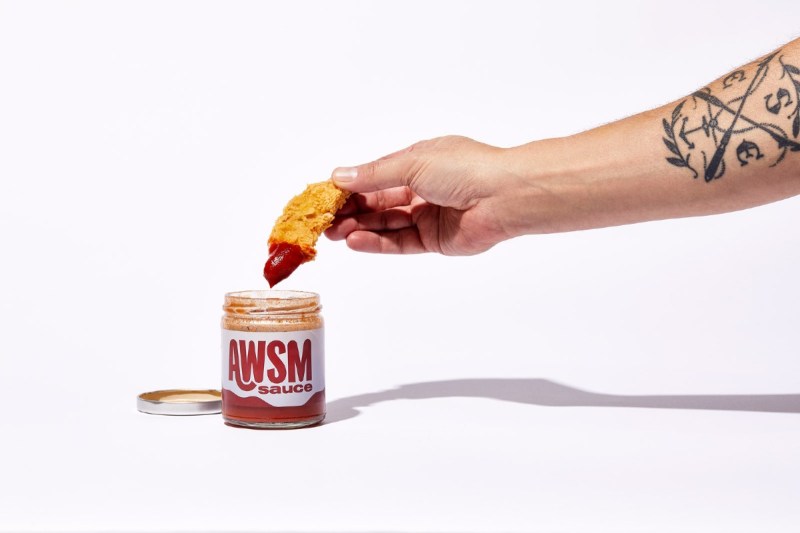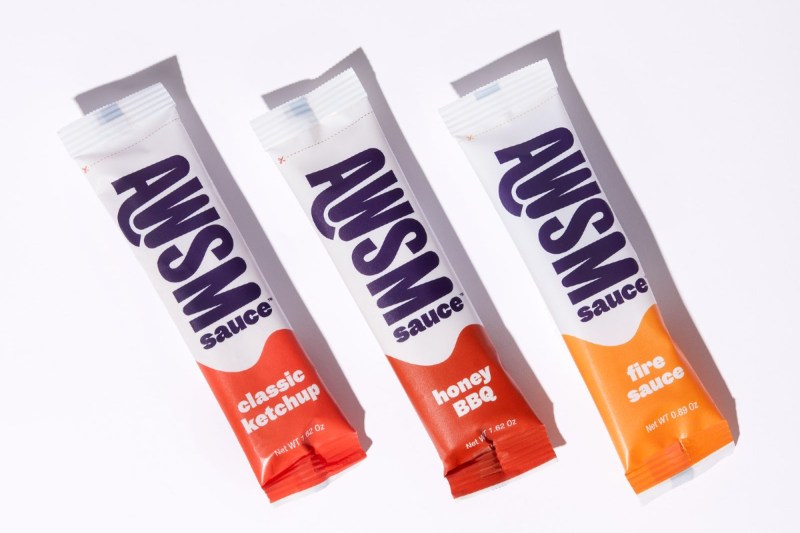Humans use about 1.2 million plastic bottles per minute, according to the Earth Day nonprofit. Approximately 91% of that plastic is not recycled. AWSM Sauce co-founders Paul Lehmann and Carl Starkey are aiming to change that, one powdered sauce packet at a time.
Their solution was a line of powder-based sauces and condiments with tasty ingredient mixes that can be mixed in reusable and compostable bottles. Right now, the AWSM sauce line features ketchup, honey hickory BBQ, and Chesapeake fire sauce.

AWSM is not only an acronym for the new powdered condiment company, it stands as a pillar of its conception — Avoid Waste, Season Meaningfully. Claiming to be the world’s first guilt-free sauce brand, AWSM delivers sweet and savory condiment ingredients to consumer doors for convenient and eco-conscious access to condiments. Instead of adding to the world’s waste, AWSM sauces come with reusable glass jars in which to mix premixed powder packets and water to deliver well-received condiments. The entrepreneurs are hoping to hit a home run while changing wasteful consumption patterns at the same time. As thousands of Minnesota fans who have already enjoyed AWSM Sauce at Target Field, their flavors rival traditional competitors.
Research estimates that between 30 and 50 percent of the total amount of food thrown away comes from home kitchens. When AWSM founders realized this, they also saw the stark reality of their own impact by simply observing their kitchen cabinets and refrigerators. Surrounded by single-use plastic bottles, the two dads did what great innovators do when faced with a problem: turn it into an opportunity.
With two decades of grilling under their belts, Starkey and Lehmann went about revolutionizing the way condiments are packaged. After countless hours of commiserating at all hours of the night and months of trying out recipes in the test kitchen, the duo was able to develop a patent-pending “powder-to-pour” technology. Then, they went about selling it.

One of their first and most significant wins was being selected by the Twins/Techstars accelerator in 2020. As one of 10 companies funded to work at the intersection of technology, sports, and entertainment, the AWSM sauce startup received three months of mentorship and workshops in addition to investment dollars.
These AWSM Sauce founders are aiming to split sales between the direct-to-consumer and business-to-business sides, aiming to work with restaurants, stadiums, and venues to not only reduce the cost of shipping but cut back on the amount of plastic they use in packaging.
AWSM home purchasers, however, shouldn’t feel any guilt about getting the condiments delivered to their door. By purchasing sauce powder packets and replacing single-use plastics, people can reduce the amount of plastic used per sauce bottle by 95%. This is not only a helpful step, it’s a critical step in looking at the dire amount of non-biodegradable waste people put in the environment every year. The amount of annual plastic produced is roughly the same as the entire weight of humanity. Roughly half of that global plastic production is destined to be a single-use product.
AWSM Sauce also cuts out the massive amount of water needed to produce ‘wet’ condiments. Powder packets only require water when they’re ready to be made.
Lehmann and Starkey are so confident about their product that they’re willing to send out free samples to taste before shoppers take the full dive into AWSM Sauce. It’s an easy step to make: fill out a form and take a single, significant step towards shaping a more sustainable consumer world.



